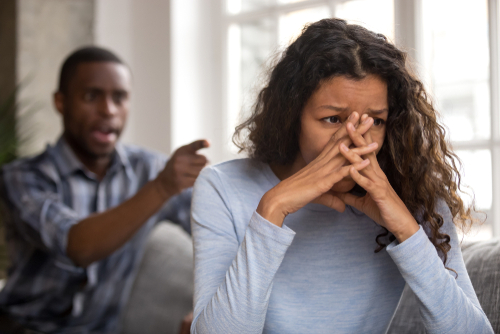Being in a relationship is difficult. Sometimes, even excruciatingly so, as not all relationships are loving, caring, and nurturing. However, refusing to open up and allowing yourself to get close to someone, and others to get close to you is never a solution.
Sometimes, people fail to commit to others because they value their privacy too much, which stops them from being open. At other times, it’s the fear of emotional abandonment that affects their ability to let someone into their world.
Whatever the reasons behind your fear of commitment, you need to be aware of the fact that, at one point or another, it would be better to overcome it. If not, your fear can lead you to unintentionally stonewall the people you care about, or cause them suffering because of emotional neglect. Emotional intimacy issues are never easy to deal with, but solutions are available and you can learn to trust your ability to commit.
Is It Normal To Be Afraid Of Commitment?

Fear of commitment can broadly be defined as the avoidance of long-term partnerships. Although fearing commitment can mean that you’re having difficulties sticking to jobs, living in the same city for extended periods of time, or changing your life goals on a regular basis, it mostly concerns romantic attachments.
There are people who have no trouble being in relationships, sharing their lives, emotions, good and bad sides with their romantic counterparts. However, for some people, opening up to others and allowing themselves to become emotionally attached to another person is extremely difficult.
Although it can be emotionally and romantically impairing to avoid romantic commitment, it is also perfectly normal to feel the way you do. There are many reasons why you’re not able to let another person come closer to you.
It might have something to do with your upbringing. Perhaps you’ve suffered emotional trauma when you were young. Or it may be down to other factors. Whatever the reason behind your relationship anxiety, know that there are many people who struggle with this. And, you can overcome this fear.
Why Am I Scared Of Commitment In A Relationship?
There are many reasons why you’re currently experiencing fear of commitment. For the majority of people, the underlying cause for fearing commitment is that they had an unpleasant relationship experience in the past.
However, the reasons behind this type of fear can be as varied and as diverse as the people who are trying to deal with it.
- Result of a poor previous relationship. It can be either due to:
- First-hand involvement in a bad relationship, either romantic or familial.
- Observational experience of poor relationships, such as parents divorcing or having an acrimonious relationship.
- Experiencing an ending to a relationship without any previous signs, warning, or notice, or fearing such an end to a relationship.
- Being in a relationship that you do not perceive as right for you, either due to lack of emotions on your partner’s part, or insufficient emotional investment on your part.
- Being part of an emotionally unhealthy relationship where you or your partner are experiencing codependency, or there is emotional abandonment, abuse, or infidelity involved.
- Developing severe trust issues due to failures of past relationships.
- Childhood abuse, abandonment, or different types of childhood traumas that cause lack of trust.
- Attachment problems that stem from unmet needs in your early childhood.
- Complicated family dynamics while you were growing up.
The reasons behind you fearing commitment are just as important as the problems this fear is causing you. Most of the time the easiest way to deal with these issues is to attend coaching sessions that will help you find your romantic self.
What Are Signs Of Commitment Issues?
Unlike the causes of your fear of commitment, the signs that point that you are, indeed, afraid of getting yourself completely emotionally involved with someone are universal. This doesn’t mean that every single person is going to exhibit identical signs of fearing commitment.
Rather, these are generalized notions that point to the fact that you might be experiencing relationship anxiety and that you might need to do something about it. Sometimes, the person you’re with is not right for you.
Other times, though, you might be sabotaging a completely healthy relationship because of your own fears. That is why you should pay attention to the following signs:
- You rarely make plans for a few weeks or months in advance.
- You have many casual friends, but no very close friends.
- You haven’t had long relationships.
- You dislike the language of commitment and tend to avoid it.
- You tend to appear inconsistent by avoiding personal commitments.
- You are frequently attracted to romantic interests you cannot attain.
- You are too picky when it comes to choosing your friends and romantic partners.
- You keep stringing your partner along without actually being emotionally prepared for a serious relationship.
- You are not the best of communicators and you tend to avoid serious conversations.
- You enjoy pursuing romantic relationships rather than being part of one.
- You feel that being in a relationship will mean losing your freedom.
- You haven’t discovered your true relationship needs yet.
Most people who fear commitment have experienced one or, more frequently, several of these symptoms. It is important to differentiate between being in a poor romantic relationship and having commitment issues. The best way to determine your current mental state is to seek help from qualified relationship advocates who can help you overcome any problems you might have.
How Do I Overcome My Fear Of Commitment?
Overcoming your fear of commitment is not easy. Nothing that requires you to look deeply into yourself is. Dealing with emotions is always tricky, especially when those emotions are of a romantic nature. However, it is completely possible to successfully overcome your fear of commitment.
Tips To Overcome Your Fear Of Commitment
There are vital steps to take in the process, steps that will help you become an individual more open to allowing others into their life.
- Discover the reason behind your fear
The first step is always to discover why you’re experiencing relationship anxiety. A qualified relationship advocate can help you reach deep inside and see what’s holding you back.
- Face your fears
Then, once you know why you’re feeling the way you’re feeling, it’s time to look that problem directly in the eye and face it head on. A certified coach will assist you in providing solutions to understand these fears and face them.
- Make some room in your life
Once you’ve done what you can about your fear of commitment, it’s time to make some room in your life for other people. Starting relationships off is tricky, but let them in, and change your life.
- Rely on yourself, not on others
However, when you do decide to let other people into your life, do not become codependent. Do not rely on them to make you feel good. You first have to love yourself in order to love others.
- Be free in love
Being in love doesn’t mean being in prison. Look for freedom in a relationship, and give that freedom back to your partner too. Do not be possessive, as it is only a road to emotional issues.
- Find a person who shares your values
Building intimacy in a relationship is challenging. When you commit to another person, you will be sharing your deepest beliefs and emotions with them. This can be frightening, but less so when the person you’re emotionally connecting with shares the same values as you.
- Be around people in healthy relationships
Finally, you cannot get a true feel of what a healthy relationship looks like without examples from your immediate surroundings. Looking at happy emotional attachments all around you can help you overcome your own fear.
Learn How To Build Intimacy In A Relationship With Our Qualified Advocates

It’s not easy when you fear getting close to someone. It can prevent you from experiencing the most beautiful moments of your life, and stop you from getting to know romantic bliss. At PIVOT, you will cooperate with experienced relationship advocates who will help you find balance and happiness in your romantic life.
We provide carefully organized relationship retreats and workshops, and we can also offer you individual coaching with our team of advocates to help you overcome your fear of commitment. We want you to be as happy as you can be. Contact a PIVOT Advocate today!



















